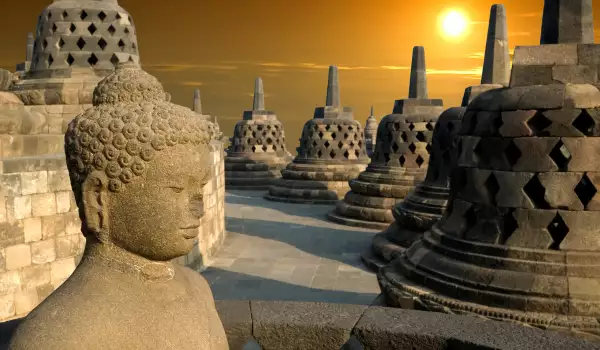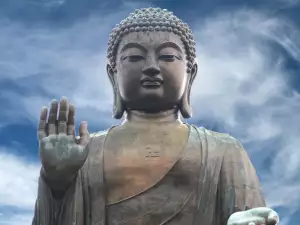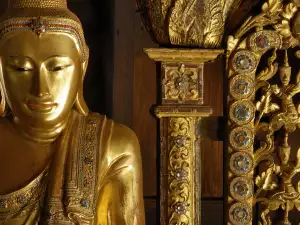Buddhism is a religion that is becoming more and more popular all over the world. The curious thing about this religion is that, unlike the others, there is no worship and belief in any God. While most people think that Buddha is a deity that Buddhists worship, the concept is slightly different. This, perhaps, is more philosophy and teaching than religion. Who or what is Buddha and do Buddhists believe in God? Is it possible to have religion without worshiping a deity?
Siddhartha Gautama was a prince who lived in the 5th century BC. His father did not allow him to leave the palace, so that he would not see the suffering and misery in which the people lived. He gets married and a child is born to the Indian prince. Despite the express prohibition, the prince leaves the palace 4 times and every time he goes out, he meets the following - an ill person, elderly person, dead person and holy man.
Siddhartha Gautama decided that vanity and affluence were not his way of life, left his family and began to study in different spiritual schools from different teachers, for 6 years. After this period, he managed to learn to control his mind, but unfortunately he did not find an answer to all the questions he had in his head.
After that, he went through other studies, but there were still no answers. Legend has it that he reached his epiphany when he heard advice from a teacher to a musician during meditation, which was to always seek the golden mean and not go to extremes in any situation. Beauty, harmony, happiness, understanding, health, love-all that man needs, must be in the golden mean.
At the age of 35, Siddhartha Gautama decided to seek Enlightenment, Nirvana and began his meditation. After a long time, he becomes a truly free person, manages to "break the shackles" of the mind, accept the spiritual and become an enlightened being. He then began to travel and now known as Buddha, gathered followers. He died at the age of 80 in India.
The foundation of Buddhism are the four truths - of dukkha, the origin, the cessation, the path to the cessation of dukkha. Translated, "dukkha" means suffering, dissatisfaction. The basis of Buddhist teaching is in this word - suffering. According to Buddhists, everything around us is suffering - life, encounters, separations, everything that surrounds us. In order to succeed in eliminating suffering, it is necessary to walk the Eightfold Path, which includes the right ones - intention, speech, view, sustenance, action, effort, concentration, consciousness.
Central to the Buddhist understandings and Buddha's teachings is that the crazed desire for something is really a lack of something else and the satisfaction of the desire is only a brief temporary comfort, after which suffering reappears on the agenda and it returns in a closed cycle, in life.
Buddha is a way of life, it means "enlightened", so it is believed that he is not God like in other religions. Buddha is a state of mind, finding the middle ground, which all believers in that religion or teaching strive for.
Whether it comes from religion or philosophy, from Christianity or Buddhism, every thought is valuable if it is true and if it makes our lives easier. Buddha is one of the legendary figures of the world, because he created a religion that bears his name. Like other religions, its teaching focuses on the idea of inner harmony, which aims to resonate with the hearts of millions of people.
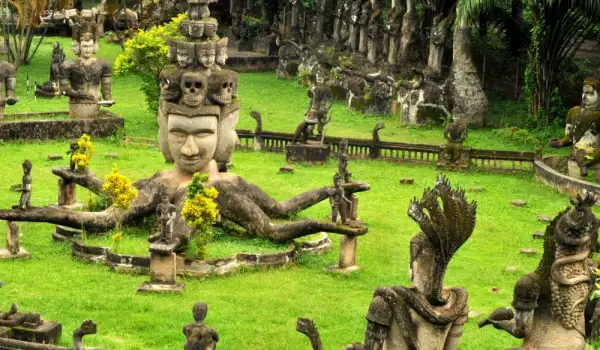
Since there are times in our lives when we feel that everything around us is gray and meaningless, personal development specialists urge us to read books, quotes or wise thoughts. Therefore, we offer you a selection of the most important Buddhist life lessons.
Thoughts become words and words have the power to soothe or cause suffering.
Words have the power to destroy and heal. When words are true and full of kindness, then they can change the whole world.
All that we are and become is a direct result of our thoughts. What we think, we become.
We must let go of fear if we want to live life to the fullest.
The whole secret of existence lies in living without fear. Never be afraid of what will happen to you.
Peace is the answer! And that can only come from within.
Instead of a thousand shallow words, a single word of peace is better, Buddhism teaches.
Be careful when choosing friends. You are what your friends are.
A dishonest and wicked friend is more to be feared than a beast; a wild animal can hurt your body, but a bad friend can hurt your mind.
A good friend who notices faults and imperfections is to be respected, because he reveals the secret of hidden treasure.
Happiness is not a destination. It's a journey.
There is no path to happiness. Happiness is the way.
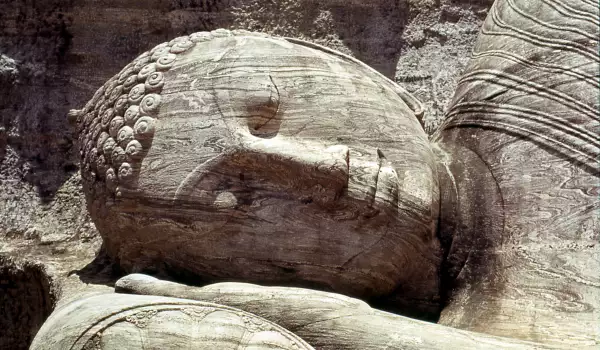
The glass is filled drop by drop. It's the same with life, with happy moments.
We must forgive!
There is no fire like passion, no shark like hate, no race like stupidity, no torrent like envy.
Self-control is a quality.
I consider him who conquers himself to be stronger than he who conquers the enemy. It is harder to defeat yourself than your enemy.
Life means unpredictability. Sometimes not everything we set our minds to happens. Our plans change. Difficulties arise. But still, we must know that no matter what happens, life is beautiful and we must always find the motivation to move forward.
More lessons from the Buddha!
See the beautiful side of people, every person has good sides and bad qualities. But instead of rejecting people because of their flaws, we better appreciate their qualities. Many people's sadness is measured in their ability to compare themselves to those around them by focusing on the negative side of things. Learn to love people and focus on the beautiful things that define them.
We said that people often suffer because they compare themselves to others. Buddhism teaches us to live in humility, but also not to compete with others. Instead, we must compete only with who we were yesterday.
Find beauty in simple things. Enjoy the sound of instruments, nature, the sound of rain or the beauty of flowers and find all that is simple and beautiful in life.
It is difficult for people who are overly critical or too proud to find joy in small things, because their minds are occupied with seemingly more important things.
Acceptance is liberation. Most people don't accept who they are. This constant rejection significantly affects their emotional state. Only when you accept your qualities and flaws do you become truly free.
When you deny the existence of a problem, you will not be able to find a solution to it.
Follow your goals. Many people know their purpose but do nothing to achieve what they were given to do in life. They just don't do anything for the calling they have. Take the time and effort to find out what your life purpose is and fulfill the assignments given to you by divinity.
Habits become values. Buddhism recommends cultivating healthy habits, because they will become values. We must work daily to strengthen them. To develop a certain group of muscles, you need to work regularly. It's the same with good habits.
